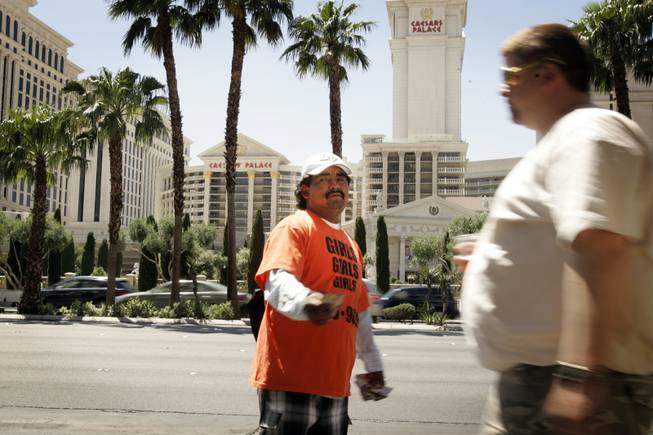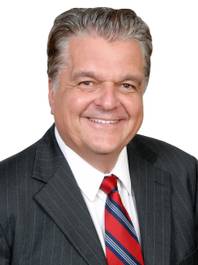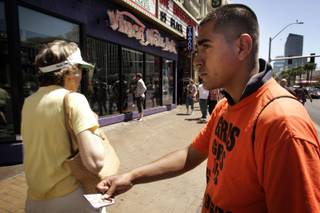
A handbiller outside the Flamingo just north of Flamingo Road on the Strip passes out cards for an escort service in May 2010.
Thursday, May 6, 2010 | 2 a.m.
Reader poll
Sun archives
- Anti-handbill signs must come down (11-22-1999)
- Strip ban on handbills challenged (5-11-1998)
- Critics claim handbill ban unconstitutional (1-22-1997)

Steve Sisolak

Chris Giunchigliani

Tom Collins
In yet another effort to address the Strip’s most notorious eyesores, Clark County commissioners are preparing to ban the “smut racks” that dot the famous roadway and restrict when and where the hordes of outcall-service handbillers can distribute glossy cards featuring near-naked women.
If the fight moves forward, it will add another chapter to the Strip’s decades-long history as a First Amendment battleground.
Clark County archives and local newspaper morgues are filled with stories, legal documents and e-mails documenting the officials’ numerous previous attempts. For more than 20 years, private attorneys have racked up countless billable hours thwarting the county’s efforts on behalf of outcall services.
Every time the county comes up with a new restriction, it has either been watered down or altogether defeated by legal challenges.
Currently, handbillers operate without restriction. But news racks in the resort corridor cannot stand in a public right-of-way or impede pedestrian or vehicular traffic. They must also be kept clean and free of graffiti, cannot be taller than 50 inches and can only be placed in permitted locations.
Despite the county’s losing record on the issue, elected officials appear optimistic about a new fight. This time they want to consider a ban on all news racks on the Strip, force the licensing of handbillers and limit where they can work.
At the urging of casino owners, Commissioners Tom Collins, Chris Giunchigliani and Steve Sisolak strolled the Strip on Friday night with casino executives to get a feel for what’s going on.
They were surprised at the piles of cards on the ground, created by tourists immediately dropping them once they realize what they’ve been handed. The aggressiveness of some handbillers also caught their attention.
Collins said he got “face to face” with one handbiller, who crossed the sidewalk to shove a card at him.
“I said, ‘You know, you can go to jail for that. That’s harassing tourists,’ ” he said. “It seems to have gotten out of control.”
Sisolak said he went back by himself Saturday night, and the handbillers were “much more aggressive,” pressing the glossy cards into his chest at least a dozen times as he walked along the Strip.
“I saw one (tourist) couple actually go into the street to avoid them,” he said.
Giunchigliani said she wants to try a less adversarial approach to address the situation. She wants to meet with the American Civil Liberties Union, casinos, outcall businesses and county staff to discuss what can be done.
“Let’s figure out a way to make this livable for everybody,” she said.
Attorney Allen Lichtenstein, general counsel for the ACLU of Nevada, said his organization would be willing to sit down with the county, but finding common ground would be difficult because such restrictions inevitably infringe on free speech rights.
“You can’t restrict those you don’t like and allow those you do, even in a town that sometimes thinks that the Constitution only applies to certain industries,” he said. “We’re not talking about passing out handbills in front of your home. We’re talking about the Las Vegas Strip — you know, Sin City ... ‘What happens in Vegas, stays in Vegas.’ Not my words, the government’s words.”
Giunchigliani, however, thinks there is legal precedent for a news rack challenge.
In 2004, a U.S. District Court upheld Boston’s banning of all news racks in a tourist area where they were considered unsightly and unfitting. Because all news racks were banned, the court said the ban did not discriminate.
The U.S. Supreme Court has never ruled in a case challenging an all-around news rack ban, but a 1993 ruling by the court seems to support the Boston decision. In that case, Cincinnati banned some news racks, arguing they posed safety hazards and only distributed “commercial handbills.” In ruling against the city, the court agreed with a ban based on safety or aesthetic reasons, but ruled Cincinnati’s ban was unconstitutional because it still allowed newspaper racks. Therefore, it discriminated.
Yet First Amendment lawyer Dominic Gentile said trying to restrict handbillers and news racks would be “foolish.”
“They are going to spend hundreds of thousands of dollars of government employee time,” Gentile said. “And they’re going to get nothing more out of it than the endorsement of the lunatic fringe conservative. If they had to spend their own money on it, then I’d be all for it, because I can tell you who’s going to be enriched by it — me.”
Gentile, who is Sisolak’s attorney, added that he would be “highly surprised if (Sisolak) took a position that amounted to nothing more than political posturing and pandering to the sensibilities of people who are offended by content.”
Sisolak countered that county officials are “not offended by the content.”
“I’m offended by the physical intimidation that exists,” he said of the handbillers.
As for the news racks, he sees a ban that eliminates all of them as fair because so few newspapers use them anymore.
For example, the Las Vegas Review-Journal’s circulation department said it has no news racks on the Strip; the Sun is distributed inside the Review-Journal.
“I can’t remember buying a newspaper from a rack,” Sisolak said. “I’ve bought them from stores, but does anybody buy them from news racks anymore?”
As they toured the Strip, the commissioners were also taken aback by abandoned orange traffic cones on the street, dirt caked on sidewalks and what they thought was a lack of concern by some casinos for the appearance of their properties.
Those issues are going to be addressed first, said Giunchigliani, who will meet with county staff today to put together a plan of attack.
“I understand keeping things up is a hassle, but we have to be concerned about our image,” she said, adding that homeless people were drinking and “camping” on walkways that pass over busy Strip intersections.
After the Strip’s upkeep is addressed, she hopes to take another crack at handbillers and news racks.
“All of this is about perception,” she said. “Vegas is jazzy, innovative — yeah, it’s sexy, too. But you don’t have to be in people’s faces with the sex.”


Join the Discussion:
Check this out for a full explanation of our conversion to the LiveFyre commenting system and instructions on how to sign up for an account.
Full comments policy